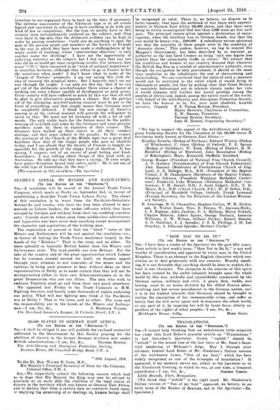185,000 SLAVES IN GERMAN EAST AFRICA. [To THE EDITOR OP
THE "SPECTATOR.") 5IR,—I shall be obliged if you will publish the enclosed memorial addressed to the Government by this Society praying for the abolition of slavery in the former German territory now under British administration.—I am, Sir, &c., TRAVERS Baxros. The Anti-Slavery and Aborigines Protection Society, Denison House, 206 Vauxhall Bridge Road, S.W. I.
" 19th August, 1918.
To the Et. Hon. WALTER H. LONG, M.P.,
His Majesty's Principal Secretary of State for the Colonies, Colonial Office, S.W. 1. •
Sia,—We respectfully submit the following reasons which lead as to hope that His Majesty the King may now be advised to proclaim at an early date the abolition of the legal status of slavery in the territory which was known as German East Africa, and to declare that from a certain date no contracts based, upon, r implying thy ownership of or dealings in, human beings shall be recognised as valid. There is, we believe, no dispute as to facts—namely, that upon the outbreak of war -there were approxi- mately in German East Africa. 185,000 slaves, and that these were being so slowly emancipated. that less than 3,000 were set free each year. The principal reason given against-a declaration of eman- cipation, when the territory was in German hands, was that the cost would-be heavy—viz.," £400,000. A subsidiary excuse advanced was that the majority of these people were in the condition of ` domestic slaves."... This system, however, we beg to remind His Maj4sty's Government, has been described by so eminent an authority as the late Lord Cromer as being only one degree less hateful than the abominable traffic in slaves: We submit that the traditions and honour of our country demand that wherever the British flag flies as a symbol of administrative authority, even though the occupation be only provisional; it should at the same time symbolize to the inhabitants the -end of slave-owning and slave-trading. We are convinced that the value of such a measure would not be restricted to the relief which it would bring to thousands of people, but that by making clear that Great Britain is resolutely determined not to tolerate slavery under her rule it would enhance still further her moral prestige among the peoples of Africa and, indeed, among the native races of the world. —On behalf of the Anti-Slavery and Aborigines Protection Society, we have the honour to be, Sir, your most obedient, humble servants, (Signed) T. F. VICTOR BUXTON, President.
HENRY BENTINCK, Chairman of Committee. E. W. Baooes, Treasurer.
TRAVERS BUXTON, Secretary.
JOHN H. HARRIS, Organizing Secretary."
"We beg to support the appeal of the Anti-Slavery and Abori- gines Protection Society for the liberation of the 185,000 slaves it territories lately known as German East Africa :-
Handley Dunelin (Bishop of Durham), Edward Winton (Bishop of Winchester), C. Oxon (Bishop of Oxford), F. E. Sarum (Bishop of Salisbury), W. Exon (Bishop of Exeter), H. H. Hereford (Bishep of Hereford), John Kensington (Bishop of Kensington), Mayo, Kinnaird, Sheffield, Gainford.
George Hooper (President of National Free Church Council), A. T. Guttery (President-elect of Free Church Federation), Alex. Ramsay (Moderator of Presbyterian Church of Eng- land), J. E. Roberts, M.A., B.D. (President of the Baptist Union), J. H. Shakespeare (Secretary of the Baptist Union), Simpson Johnson (President Wesleyan Methodist Confer- ence), Frederick Luke Wiseman (Wesleyan Methodist Con- ference), J. H. Jewett, D.D., J. Scott Lidgett, D.D., F. B. Meyer, B.A., D.D. (Christ Church, S.E.), W. B. Selbie, D.D., "(Principal of Mansfield College, Oxford), Frank Lenwood (Foreign Secretary, for the Directors of the London Mission- ary Society), R. Armitage, H. G. Chancellor, Stephen Collins, W. H. Dickin- son, R. Walter Essex, Thos. R. Ferens, W. Joynson-Hicks, J. S. Higham, John Jardine, P. A. MolMno, -Harry Nuttall, Charles Roberts, Albert Spicer, George Toulmin, Aneurin Williams, J. W. Wilson, Gilbert _Parker, Robert Donald, A. G. Gardiner, J. A. Spender, J. S. R. Phillips, J. St. Loe Strachey, A. Edmund Spender, Herbert Clarke."


























 Previous page
Previous page